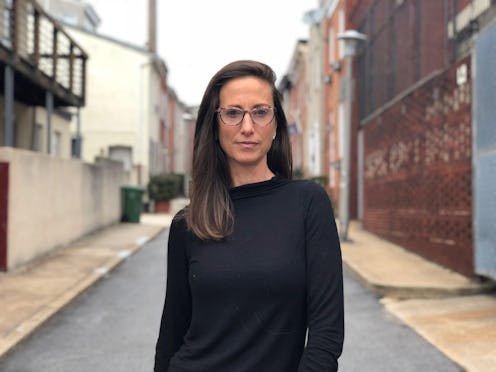News
The Founder Of A “Me Too” Super PAC Thinks The Movement Is Bigger Than Anyone Imagined

When stay-at-home mom Sarah Sherman first came across the #MeToo hashtag, she had what she describes as an "out-of-body experience." Empowered by a network of support she never knew existed, she wanted take the energy of the movement and help women make real change. So on March 5, Sherman launched the Vote Me Too Super PAC as a way to support female politicians who back legislation that protects women, especially victims of sexual violence. And for people who feel she's diluting the message of the movement by using the "Me Too" moniker, Sherman says they're missing the point.
"I wanted to garner the energy of the Me Too movement," Sherman tells Bustle, "and push it forward with women candidates that are actually going to be paying attention to law making regarding those topics. When we elect women and get more women in power, it’s going to have a huge cultural difference in our laws, and how people really view and provide care for women."
Sherman spoke briefly with Tarana Burke, the woman credited with starting the Me Too movement, about the super PAC at The State of Our Union event in Washington D.C. However, Burke says she wasn't aware Sherman was using "Me Too" in the PAC's name.
"The 'Me Too' movement is focused on supporting survivors of sexual violence with the resources they need to craft a healing journey, and about helping people become active in their communities to do the work of ending sexual violence," Burke tells Bustle. "I don't know how the PAC will do that work or if it has to [be] called 'Me Too' in order to do what she is proposing."
But Sherman, who says she was sexually assaulted when she was 15, believes the PAC's work will live up to the Me Too name. "I’m not forgetting that Tarana Burke started this," Sherman says. "She is my inspiration, but I think it’s gotten bigger than she had ever imagined, and it’s helped out so many women. It’s hard to say, 'Well we can’t help women, we’re not going to help women,' because of a name. If the best good can come out of it, and if the name helps, then that’s what I’m going to do."
"When I was growing up and I was assaulted, it was just kind of acceptable."
Like other super PACs, Vote Me Too will raise funds from companies and individuals (you can donate here), then use that money to collaborate with and support political candidates. In this instance, Vote Me Too will create high-end video content for female politicians "that are focused on helping women like myself," Sherman says.
And because she lives in Baltimore, what she considers to be a progressive area, Sherman sees the PAC as a way to "help other women around the country" by electing candidates that will "implement legislation that will hopefully stop [predators.]"
Working with her husband's production company, StoryFarm, Sherman says they will create specific online video content for candidates "so they can cross the finish line when it gets crazy at the end" of the campaign. "And we really believe that video is without question the most powerful and effective internet communication tool," she adds.
The PAC released two videos on its launch date. The first, "Where Are The Women?", helps draw attention to the fact that there's not enough female representation in Washington through a series of interviews at the Women's March. The second video, "What's Wrong With This Picture?", which includes clips of Trump's mostly male, mostly white administration, emphasizes the fact that it's a lot of older white men who are making decisions on behalf of all Americans.
This is what Sherman wants to change. "When I was growing up and I was assaulted, it was just kind of acceptable," she says. "I really didn't have anywhere to turn, and I think that if we can shift the cultural dynamic through legislation, with more women in Washington, then at least we can get the ball rolling when it comes to laws protecting women."
Sherman says that by using the "Me Too" name, she'll not only be able to reach a wider audience, but she can give women an actionable outlet for their frustration. "Certainly there’s a giant awareness that’s been brought about," Sherman says, "but at the same time, if we don’t see more women in office, I don’t think it’s going to make much of a difference unfortunately."
Vote Me Too is particularly focused on working with women who haven't been in office before and women of color. "I want to stay true to the Me Too movement, which ... really affected women of color," she says. "And I want to honor that."
Sherman hopes any critics will eventually see how the Vote Me Too PAC and the candidates it supports help victims of sexual violence. In the meantime, she says, this experience has already been cathartic. "It's a giant healing process for me," she says. "I’m affected by something that happened to me when I was 15 years old — and every day." Now, she's reshaping her idea of what it means to be a survivor.
"Surviving doesn’t mean you’re some meek person sitting in a corner," she says. "It means that you use your voice and you speak. And I’m going to power through the idea that people think [Me Too] is overused. It’s one thing to be able to read people's stories and to have Oprah get up and talk about it, but unless we’re really doing anything when we walk into the voting booth, then how much more of a difference is it going to make?"
Celia Darrough contributed to this report.